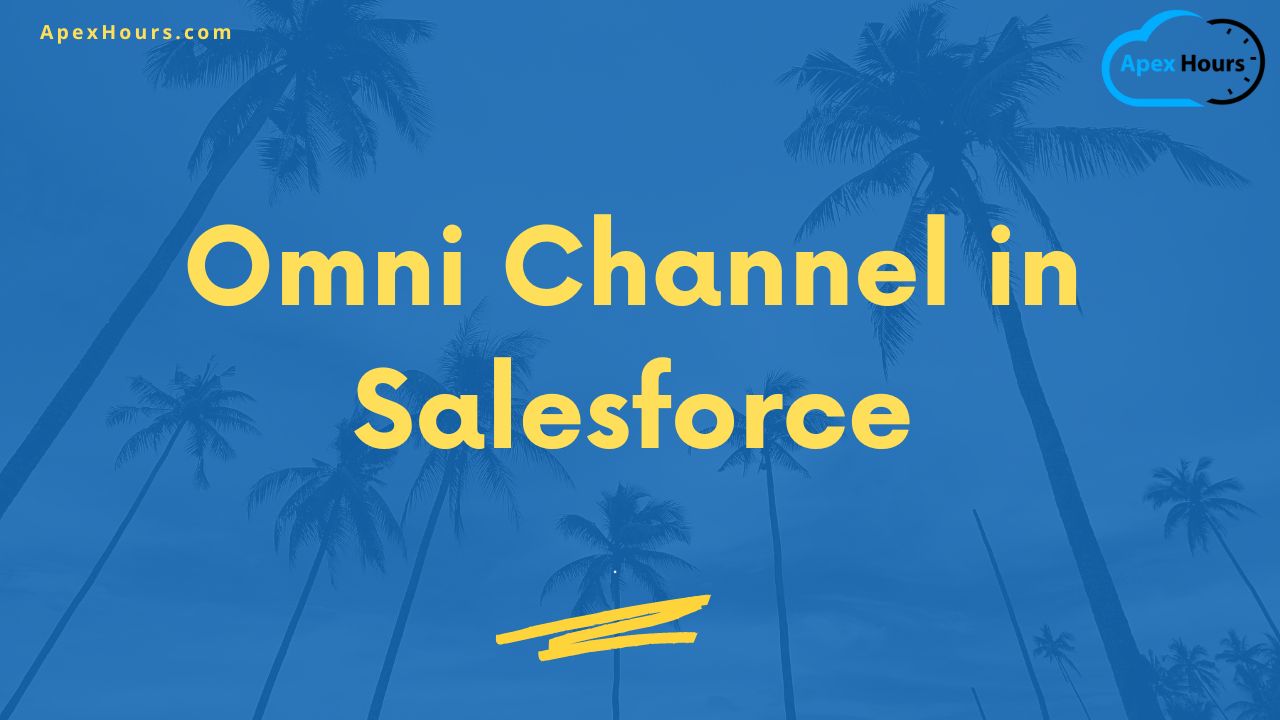Omni-Channel in Salesforce is a feature that used in Service Cloud to automatically pushes work to your users in real time. Word “Channel” of-course means the way of communication e.g.-phone, web, email, etc and the word “Omni” means one way to get this communication through and reach out to the customers to solve their issues. Let join us to learn about Salesforce Omni-Channel.
Channel your Omni! Discover a super powerful workload automation tool already included in your Service Cloud that for some mysterious reason you are not yet using. Manage workload: configure how to route, when to route, what to route, to whom to route and jump in to the rescue when your team needs help. Plus get real-time data at your fingertips! so that your can inspect and adapt your operations to become more effective. We did one session with Ines Garcia and Chris Bick here are some highlights.
What is Omni-Channel?
Salesforce Omni-Channel is a tool that sits inside of either the Sales or Service Console that, once enabled and configured, automatically pushes work to your users in real time. Omni-Channel takes incoming work items and routes them to the most qualified, available support agents using the routing criteria that you define.
What is Omni-Channel Routing?
Omni-Channel basically checks the assigned work items and then will route the work items to the most qualified, available support agents using the routing criteria that you define. There are three ways from which we can do Omni-Channel Routing.
- Queue-Based Routing
- Skill-Based Routing
- External Routing
1. Queue-Based Routing
You assign agents to queues, which typically represent a single skill. Omni-Channel assigns work items to a queue and then pushes work items to an agent who is a member of that queue.
- Omni-Channel assigns work items to a queue
- Pushes work items to an agent who is a member of that queue.
Best Use Case of Queue-Based Routing
Best for smaller organizations that support a limited number of products
2. Skill-Based Routing
Skills-based routing looks at the skills required to complete a work item and matches these to the skills that are assigned to the agent.
Best Use Case for Skill-Based Routing
Best for larger organizations that: Have many agents that support many products. Support products that require complex skill sets. Support customers in many countries or across multiple languages.
3. External Routing
A third-party routing implementation of your choice routes work items through Omni-Channel to agents via the Salesforce Service Console. A developer uses APIs to integrate the partner routing application with Salesforce.
A third-party routing implementation of your choice routes work items through Omni-Channel to agents via the Salesforce Service Console. A developer uses APIs to integrate the partner routing application with Salesforce.
Best UseCase of External Routing
Best for organizations that want to route work to the Salesforce Service Console while keeping the routing implementation that the organization currently uses.
Why Omni Channel
Work can come from everywhere nowadays and as new channels emerge can feel like this, as business is a struggle to keep up and as customer can be frustrated (34% of millennials say they’d rather go to the dentist than call a customer service) and I can relate!
A true omni-channel customer service center allows your customers to connect seamlessly with your support staff using multiple channels. At the same time, your support agents have immediate access to a holistic picture of the person they’re about to help.Without passing the customer around the houses and resolving issues quickly.
- Service Channels: let you turn nearly any Salesforce object, such as a case, lead, messaging session, or even a custom object―into a work record.
- Routing Configurations: determine how work items are routed to agents. you can use them to prioritize the relative importance and size of work items from your queues. That way, the most important work items are handled accordingly, and work is evenly distributed to your agents.

To start routing work items to agents, create routing configurations and assign them to queues. which leads us to
- Associate Routing Configurations and Agents with Queues
Queues are a classic element of Salesforce that help your teams manage leads, cases, contact requests, and custom objects. Omni-Channel supercharges your queues to be able to route work items to your agents in real time. Agents don’t have to select work items manually from queues because Omni-Channel routes work items to agents automatically and in real time! - Presence 2 types configurations & statuses
- Configurations: Presence configurations determine how much work agents can take on and what Omni-Channel behaviors they can access while they assist customers. So you can have various configurations for different groups of agents who support different channels.
Set how much can an agent handle. Also define if agents can ‘decline’ incoming work
- Presence Statuses: indicate whether an agent is online and available to receive incoming work items, or whether the agent is away or offline.
Omni Channel in salesforce Video
Check our session with Ines Garcia and Chris Bicknell. Please subscribe our YouTube channel to get notification for video upload.
Summary
New to Service Cloud? Check our service cloud sessions FREE Training. Thanks Ines Garcia and Chris Bicknell for such a great session and content.






HI Amit,
Can I route Cases to Queues (not users) using Omni channel? Or omni channel only works to route cases to individual users?
Omni-channel helps you to route the work items to queues and queue members can then take ownership of the work item. Work items will remain in the queue untill any agents accepts the work item. Work items can also be routed to agents based on their skill sets.